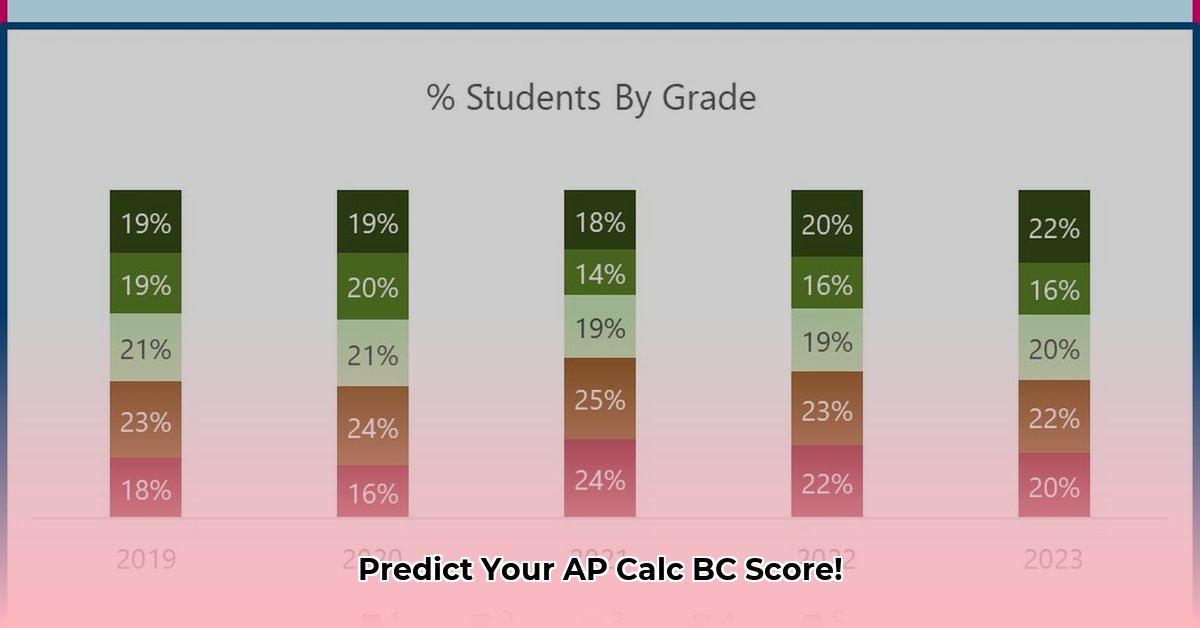This guide helps you navigate the AP Calculus BC scoring system, predict your score, and understand what it means for college credit. Think of this as your friendly, jargon-free guide to AP Calculus BC scores.
How AP Calculus BC Scoring Works
Let’s break down how the AP Calculus BC exam is scored. It’s like baking a cake – you need the right ingredients in the right proportions. Here, your ingredients are the multiple-choice and free-response sections.
The Two Main Ingredients: Multiple-Choice and Free-Response
- Multiple-Choice: These questions are graded automatically. Each correct answer earns you a point. Incorrect answers don’t deduct points.
- Free-Response: Trained graders evaluate these in-depth questions. They look for correct answers, clear reasoning, and complete explanations. Points are awarded based on specific rubrics.
Combining the Ingredients: Weighting and the Composite Score
Each section contributes 50% to your raw score. This balanced approach ensures a thorough assessment of your calculus skills, from quick problem-solving to in-depth analysis. The combined score from both sections is your composite score.
The Secret Sauce: The Curve
Your composite score isn’t directly translated to the 1-5 AP score. Instead, it’s placed on a curve. This curve adjusts each year based on exam difficulty and overall student performance. This ensures fairness, acknowledging that some years’ exams may be tougher than others.
Using the 2024 AP Calculus BC Score Calculator
A score calculator can help you estimate your AP score. It’s like using a compass – it gives you a general direction, but the final destination might vary slightly.
How It Works
- Find a Reputable Calculator: Look for calculators from trusted educational resources. (We’ll link to some reliable options soon!)
- Input Your Multiple-Choice Estimate: Estimate the number of multiple-choice questions you answered correctly.
- Estimate Your Free-Response Scores: Review the official rubrics and sample responses to gauge your performance. Estimate a score for each free-response question.
- Calculate: The calculator uses your input and scoring data (often from previous years) to generate a predicted AP score.
- Interpret with Caution: Remember, this is an estimate. The actual 2024 curve will be determined after the exam.
Interpreting Your AP Score
Your AP score, a number from 1 to 5, reflects your exam performance. A 5 signifies exceptional achievement, while a 1 suggests minimal understanding. But what does it mean practically?
What the Numbers Mean
- 5: Extremely Well Qualified: This is the top score, demonstrating mastery of the material.
- 4: Well Qualified: Indicates a strong understanding of the concepts.
- 3: Qualified: Shows a solid grasp of the fundamentals.
- 2: Possibly Qualified: Suggests some understanding, but significant gaps remain.
- 1: No Recommendation: Indicates minimal understanding of the material.
College Credit and Placement
Many colleges offer credit and placement for scores of 3 or higher. This can save you time and money by allowing you to skip introductory calculus. However, each college has its own policies. Research the requirements of the colleges you’re interested in.
AP Calculus BC Score Distributions and Curves
Once the College Board releases the 2024 score distributions, we’ll provide a table and graphs here. This data provides context, showing the percentage of students achieving each score. We’ll also analyze trends and discuss how the 2024 curve compares to previous years.
Tips for Improving Your Score
Didn’t get the score you wanted? No problem! Targeted practice is key. Identify your weak areas and focus your study efforts there. Practice free-response questions under timed conditions and seek out resources for topics you find challenging.
College Credit Policies
Earning college credit with AP scores can be a huge advantage. We’ll provide links to resources to help you find specific college and university requirements, empowering you to translate your hard work into valuable college credit.
Frequently Asked Questions (FAQs)
We’ll compile a list of frequently asked questions here, addressing common queries about the scoring process, the curve, and college credit policies.
Disclaimer
Remember, score predictions are estimates. Many factors can influence the final curve. The AP program, AP Calculus BC, and associated trademarks are owned by the College Board. This guide provides helpful information but doesn’t guarantee any specific outcome. We strive to give you the most accurate and insightful information, but the official results and interpretations rest with the College Board.
- Divided Food Storage Containers Transform Meal Prep and Portion Control - February 8, 2026
- Divided Food Containers Are Meal Preps Secret Weapon - February 7, 2026
- Food Kits for Adults Offer Fun DIY Cooking Adventures - February 6, 2026










